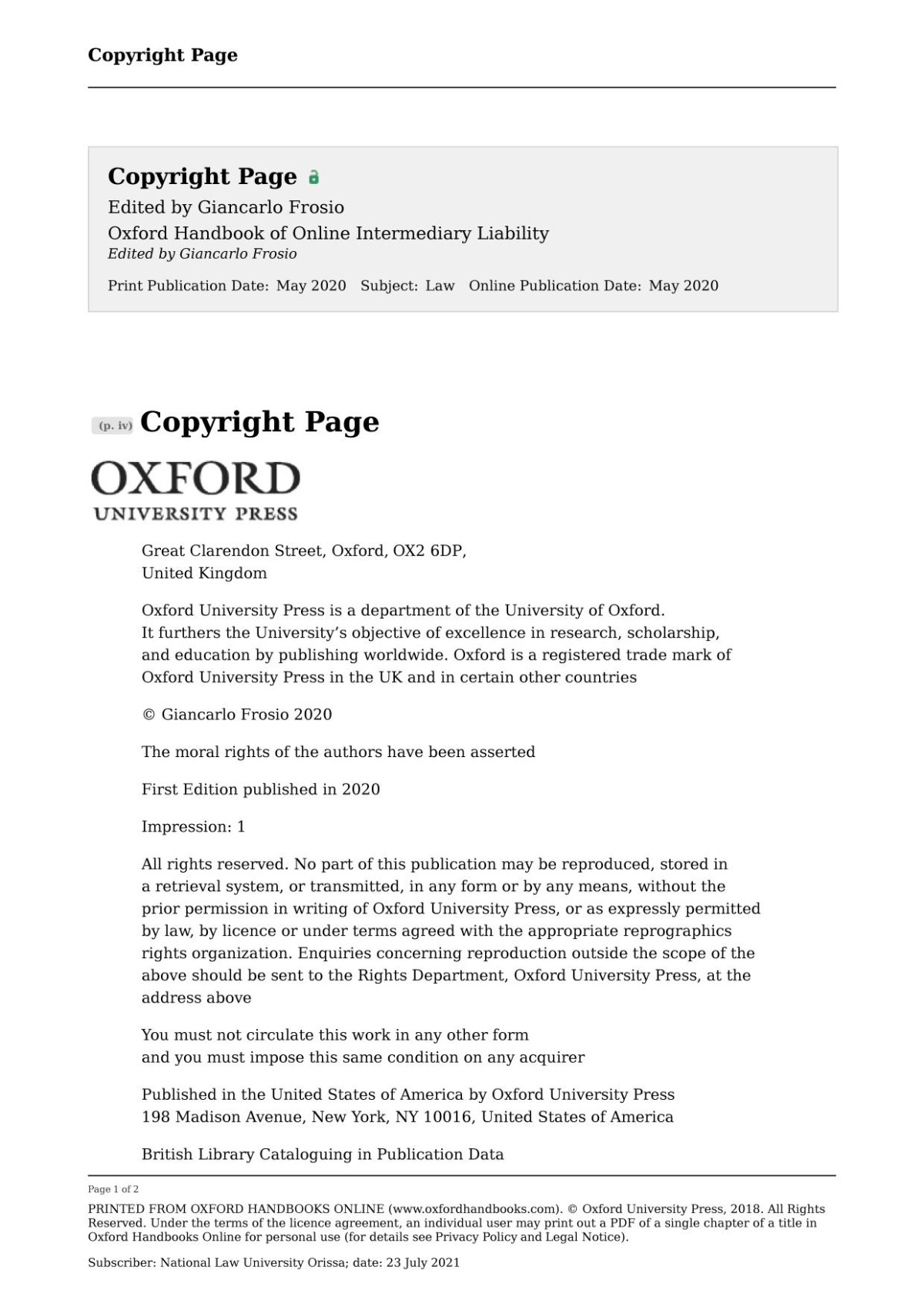(EBOOK PDF)Oxford Handbook of Online Intermediary Liability 1st Edition by Giancarlo Frosio 9780192573988 0192573985 full chapters
$50.00 Original price was: $50.00.$25.00Current price is: $25.00.
Oxford Handbook of Online Intermediary Liability 1st Edition by Giancarlo Frosio – Ebook PDF Instant Download/Delivery: 9780192573988, 0192573985
Full download Oxford Handbook of Online Intermediary Liability 1st Edition after payment

Product details:
• ISBN 10:0192573985
• ISBN 13:9780192573988
• Author:Giancarlo Frosio
Oxford Handbook of Online Intermediary Liability
To better understand the heterogeneity of the international online intermediary liability regime, The Oxford Handbook of Intermediary Liability Online is designed to provide a comprehensive, authoritative and ‘state-of-the-art’ discussion of by highlighting emerging trends. This book discusses fundamental legal issues in intermediary liability online, while also describing advancement in intermediary liability theory and identifying recent policy trends. Sections I and II provide a taxonomy of internet platforms, a general discussion of possible basis for liability and remedies, while putting into context intermediary liability regulation with fundamental rights and the ethical implications of the intermediaries’ role. Section III presents a jurisdictional overview discussing intermediary liability safe harbour arrangements and highlighting issues with systemic fragmentation and miscellaneous inconsistent approaches. Mapping online intermediary liability worldwide entails the review of a wide-ranging topic, stretching into many different areas of law and domain-specific solutions. Section IV provides an overview of intermediate liability for copyright, trademark, and privacy infringement, together with Internet platforms’ obligations and liabilities for defamation, hate and dangerous speech. Section V reviews intermediary liability enforcement strategies by focusing on emerging trends, including proactive monitoring obligations across the entire spectrum of intermediary liability subject matters, blocking orders against innocent third parties, and the emergence of administrative enforcement of intermediary liability online. In addition, Section VI discusses an additional core emerging trend in intermediary liability enforcement: voluntary measures and private ordering. Finally, international private law issues are addressed in Section VII with special emphasis on the international struggle over Internet jurisdiction and extra-territorial enforcement of intermediaries’ obligations.
Read Less
This is a digital product.
Additional ISBNs
9780198837145, 9780192573971
Subjects
Law,
Computer & Internet
Oxford University Press Academic UK Return Policy
Easy 14-day returns whenthese requirementsare met. View all policies.Opens in new window
Oxford Handbook of Online Intermediary Liability 1st Table of contents:
Cover
Halftitle page
Title Page
Copyright page
Contents
Editor’s Note: A Dialogue on the Role of Online Intermediaries
Notes on Contributors
Part I: Introduction
1. Mapping Online Intermediary Liability
1. Mapping Fundamental Notions
2. Mapping International Fragmentation: From Safe Harbours to Liability
3. Mapping Subject-Specific Regulation
4. Mapping Intermediary Liability Enforcement
5. Mapping Private Ordering and Intermediary Responsibility
6. Mapping Internet Jurisdiction, Extraterritoriality, and Intermediary Liability
Part II: Mapping Fundamental Notions
2. Who are Internet Intermediaries?
1. Definitions of ‘Internet Intermediaries’
2. Alternative Terms
3. A Functional Taxonomy
4. Typological Considerations
5. Conclusions
3. A Theoretical Taxonomy of Intermediary Liability
1. What is ‘Liability’?
2. Classifying Liability
3. Justifying Intermediary Liability
4. Types of Wrongdoing
5. Conclusions
4. Remedies First, Liability Second: Or Why We Fail to Agree on Optimal Design of Intermediary Liability
1. Three Legal Pillars
2. Distinguishing Reasons from Consequences
3. Typology of Consequences
4. Putting the Cart before the Horse
5. Conclusions
5. Empirical Approaches to Intermediary Liability
1. Volume of Notices
2. Accuracy of Notices
3. Over-Enforcement and Abuse
4. Due Process and Transparency
5. Balancing of Responsibilities and Costs
6. Conclusion: Limitations, Gaps, and Future Research
6. The Civic Role of OSPs in Mature Information Societies
1. Managing Access to Information
2. Human Rights: Harmful Content and Internet Censorship
3. The Civic Role of Osps in Mature Information Societies
4. Conclusion: The Duty of Ethical Governance
7. Intermediary Liability and Fundamental Rights
1. Users’ Rights
2. OSPs, Freedom of Business, and Innovation
3. IP Owners and Property Rights
4. Conclusions
Part III: Safe Harbours, Liability, and Fragmentation
8. An Overview of the United States’ Section 230 Internet Immunity
1. Pre-Section 230 Law
2. Section 230’s Protections for Defendants
3. Section 230’s Implications
4. Comparative Analysis
5. What’s Next for Section 230?
9. The Impact of Free Trade Agreements on Internet Intermediary Liability in Latin America
1. Background: Notice and Takedown in the Dmca
2. Free Trade Agreements and Notice-and-Takedown Provisions
3. Implementation of FTA Intermediary Liability Provisions in Latin America
4. The Convenience of the Dmca Approach for Notice and Takedown in Latin America
5. Conclusions
10. The Marco Civil da Internet and Digital Constitutionalism
1. The Civil Rights Framework for the Internet
2. The ‘MCI on the Books’
3. The MCI in Practice
4. The MCI and Digital Constitutionalism
5. Concluding Remarks
11. Intermediary Liability in Africa: Looking Back, Moving Forward?
1. The Slow Rise of the Intermediary Liability Discourse in Africa
2. First-generation Liability Limitations
3. Interstate Cooperation in the African Region: Implications for Intermediary Liability
4. Second-generation Liability Limitations: the Rise of Hybrid Instruments
5. Conclusion: The Role of the African Union and the Promise of the South African Model
12. The Liability of Australian Online Intermediaries
1. Liability: Active Intermediaries and Recalcitrant Wrongdoers
2. Limiting Devices and their Flaws
3. Conclusions
13. From Liability Trap to the World’s Safest Harbour: Lessons from China, India, Japan, South Korea, Indonesia, and Malaysia
1. China
2. India
3. Japan
4. Indonesia
5. Malaysia
6. South Korea
7. Epilogue
14. China’s IP Regulation and Omniscient Intermediaries: Oscillating from Safe Harbour to Liability
1. Intermediary Liability for Trade mark Infringement
2. Intermediary Liability in the Case of Copyright Liability
3. Conclusions
15. A New Liability Regime for Illegal Content in the Digital Single Market Strategy
1. The Issue of Illegal Content within the DSM Strategy
2. Copyright-Infringing Content and the Copyright in the DSM Directive
3. Harmful Content within the Reformed AudioVisual Media Service Directive
4. Misleading content and the Unfair Commercial Practices Directive
5. Final Remarks
Part IV: A Subject Matter-Specific Overview
16. Harmonizing Intermediary Copyright Liability in the EU: A Summary
1. The Current Incomplete EU Framework for Intermediary Liability in Copyright
2. The National Regimes on Intermediary Liability in Copyright
3. Intermediary Liability and Tort Law
4. Building a Complete Framework for European Intermediary Liability in Copyright
5. Closing Remarks
17. The Direct Liability of Intermediaries
1. The right of communication to the public as construed through case law
2. Liability of Platform Operators for the Making of Acts of Communication to the Public: The Pirate Bay Case
3. Applicability of C-610/15 Stichting Brein to Less Egregious Scenarios
4. Other Implications: Primary/Secondary Liability and Safe Harbours
5. Conclusion
18. Secondary Copyright Infringement Liability and User-Generated Content in the United States
1. Secondary Copyright Infringement in Common Law
2. The Digital Millennium Copyright Act
3. User-Generated Content in The Shadow of The DMCA and Case Law
4. Policy Activity
5. Secondary Copyright Infringement Liability for Online Intermediaries Outside the United States
6. Conclusions
19. Intermediary Liability and Online Trade Mark Infringement: Emerging International Common Approaches
1. The ‘Ratio’ Principles of Intermediary Responsibility—International Common Approaches
2. The Ius Gentium of Voluntary Measures—International Common Approaches
3. Conclusions
20. Intermediary Liability and Trade Mark Infringement: Proliferation of Filter Obligations in Civil Law Jurisdictions?
1. Trade Mark Rights
2. Limitations of Trade Mark Rights
3. Developments in Case Law
4. Conclusions
21. Intermediary Liability and Trade Mark Infringement: A Common Law Perspective
1. Who are Online Intermediaries?
2. Primary Liability of Intermediaries for Trade Mark Infringement
3. Accessory Liability of Intermediaries for Trade Mark Infringement
4. Injunctions Against Intermediaries Whose Services are Used to Infringe Trade Marks
22. Digital Markets, Rules of Conduct, and Liability of Online Intermediaries—Analysis of Two Case Studies: Unfair Commercial Practices and Trade Secrets Infringement
1. Problem Definition
2. Online Intermediaries: Walking a Tightrope Between Immunity from Liability and Remedies
3. Unfair Commercial Practices via Online Intermediaries
4. Trade Secrets Infringement via OIs
5. Assessment
23. Notice-and-Notice-Plus: A Canadian Perspective Beyond the Liability and Immunity Divide
1. Legal Context
2. Proposal for Reform
3. Notice-and-Notice-Plus Beyond Defamation Law
4. Conclusions
24. Free Expression and Internet Intermediaries: The Changing Geometry of European Regulation
1. The European Regulatory Framework
2. Geometrical Shifts
3. Conclusions
25. The Right to Be Forgotten in the European Union
1. The Right to be Forgotten Vis-à-Vis Search Engines
2. The Right to be Forgotten Vis-à-Vis Primary Publishers
3. Conclusions
26. Right to be … Forgotten? Trends in Latin America after the Belén Rodriguez Case and the Impact of the New European Rules
1. The Belén Rodriguez Case: Something New Under the Sun?
2. Trends in Latin America: What do they Follow?
3. The Right to Privacy and the Right to Freedom of Expression Under the Inter American System of Human Rights and its Impact on the Right to be Forgotten
4. Conclusions
Part V: Intermediary Liability and Online Enforcement
27. From ‘Notice and Takedown’ to ‘Notice and Stay Down’: Risks and Safeguards for Freedom of Expression
1. Impact on Freedom of Expression
2. Notice and TakeDown
3. Notice and Notice
4. Notice and Stay Down
5. Conclusions
28. Monitoring and Filtering: European Reform or Global Trend?
1. OSP as a ‘Mere Conduit’: ‘No Monitoring’ Obligations
2. From ‘Mere Conduits’ to ‘Gate-Keepers’? The Global Shift in Intermediary Liability
3. The EU Copyright Directive in the Digital Single Market: Legitimation through Legislation?
4. Effect on Fundamental Rights
5. Conclusions
29. Blocking Orders: Assessing Tensions with Human Rights
1. A Freedom of Expression Perspective on Website Blocking: The Emergence of User Rights
2. A Freedom to Conduct a Business Perspective on Website Blocking: The (Rising) Role of the ISPS in Digital Copyright Enforcement
3. A Right to Property Perspective on Website Blocking: Effectiveness of the Blocking
4. Recent EU Copyright Reform and its Effects on Website Blocking and Fundamental Rights
5. Conclusions
30. Administrative Enforcement of Copyright Infringement in Europe
1. The European Landscape: Spain, Italy, and Greece
2. The Legal Context
3. The Essential Features
4. The AGCOM Regulation in Practice: A Case Study
Part VI: Intermediary Responsibility, Accountability, and Private Ordering
31. Accountability and Responsibility of Online Intermediaries
1. Tools for Increasing Responsibility
2. Mechanisms and Legal Challenges
3. Conclusions
32. Addressing Infringement: Developments in Content Regulation in the US and the DNS
1. ICANN, the DNS, and DNS Intermediaries
2. The History of Intellectual Property Enforcement in the DNS
3. ICANN’s new gTLD Programme and IP Stakeholder Demands
4. Expanding IP Enforcement in the DNS: Within and Without ICANN
5. Conclusions
33. Intermediary Liability in Russia and the Role of Private Business in the Enforcement of State Controls over the Internet
1. Russian Internet
2. The Evolution of Internet Regulations and ISP Liability
3. How the Government Relies on Intermediaries
4. Compliance Dilemma
5. Transparency and Compliance with Human Rights
6. Conclusions
34. Guarding the Guardians: Content Moderation by Online Intermediaries and the Rule of Law
1. Content Moderation by Platforms and The Rule of law
2. Barriers to Accountability
3. Enhancing Intermediaries’ Oversight
4. Future Challenges
35. Algorithmic Accountability: Towards Accountable Systems
1. Accountable to whom?
2. Accountability for what?
3. Challenges with Algorithmic Accountability
4. What does Algorithmic Accountability mean in the context of Intermediary Liability Online?
5. Conclusions
Part VII: Internet Jurisdiction, Extraterritoriality, and Liability
36. Internet Jurisdiction and Intermediary Liability
1. Internet Intermediaries and Jurisdiction
2. Terms of Service, Jurisdiction, and Choice of Law
3. Access to Evidence and Jurisdiction
4. Scope of Jurisdiction of Content Blocking
5. Concluding Remarks
37. The Equustek Effect: A Canadian Perspective on Global Takedown Orders in the Age of the Internet
1. Where it all Began: The Yahoo France Case
2. Equustek Solutions v Google: Internet Jurisdiction Hits Canada’s Highest Court
3. Supreme Court of Canada Hearing
4. The Supreme Court of Canada Decision
5. After Equustek: The Risks of Global Takedown Orders From National Courts
6. Conclusions
38. Jurisdiction on the Internet: From Legal Arms Race to Transnational Cooperation
1. National Jurisdictions and Cross-Border Data Flows and Services
2. A Legal Arms Race in Cyberspace?
3. Limits to International Cooperation
4. A Dangerous Path
5. Filling the Institutional Gap in Internet Governance
6. Towards Transnational Frameworks
7. Conclusions
Index
Read More
People also search for Oxford Handbook of Online Intermediary Liability 1st:
the oxford handbook of online
the oxford handbook of criminology online
the oxford handbook
the oxford handbook series
the oxford handbook of the history of ethics
Tags:
The Oxford Handbook.Online Intermediary,Intermediary Liability,Giancarlo Frosio
You may also like…
Politics & Philosophy - Others
Engineering - Robotics & Artificial Intelligence
Uncategorized
The Oxford Handbook of Compassion Science (Oxford Library of Psychology) 1st Edition, (Ebook PDF)
Uncategorized
The Oxford Handbook of Philosophy and Race (Oxford Handbooks) 1st Edition, (Ebook PDF)







